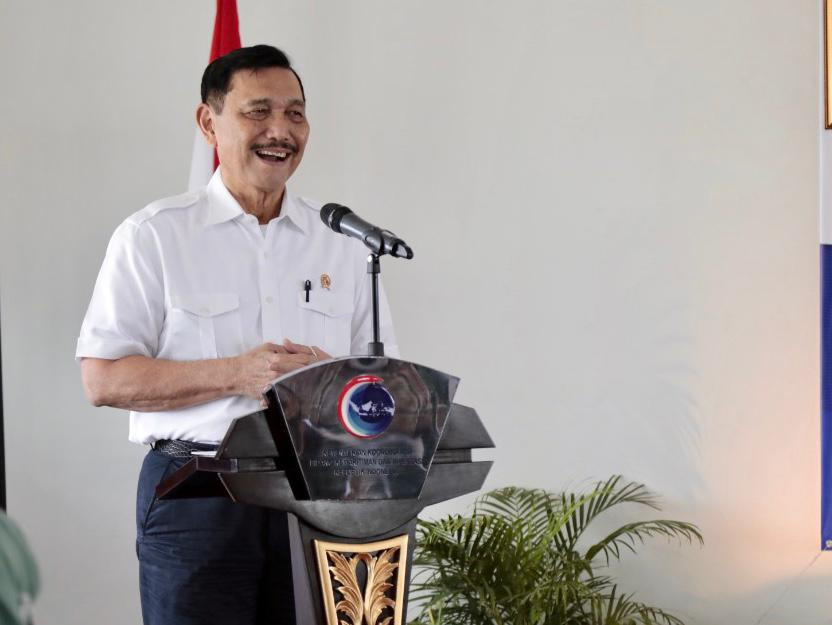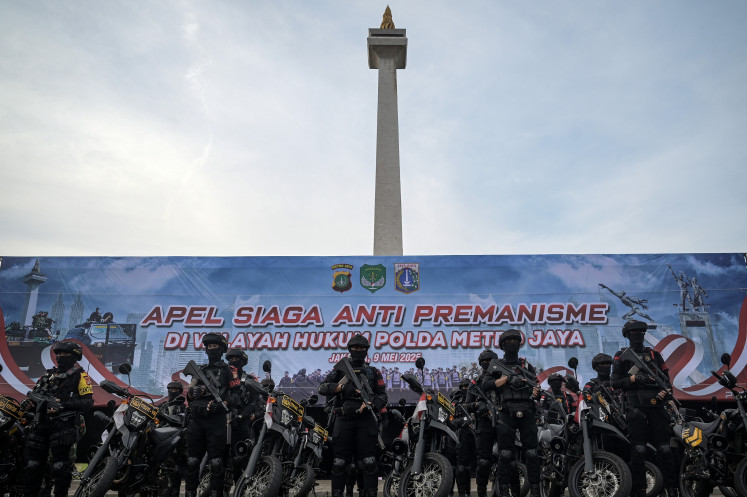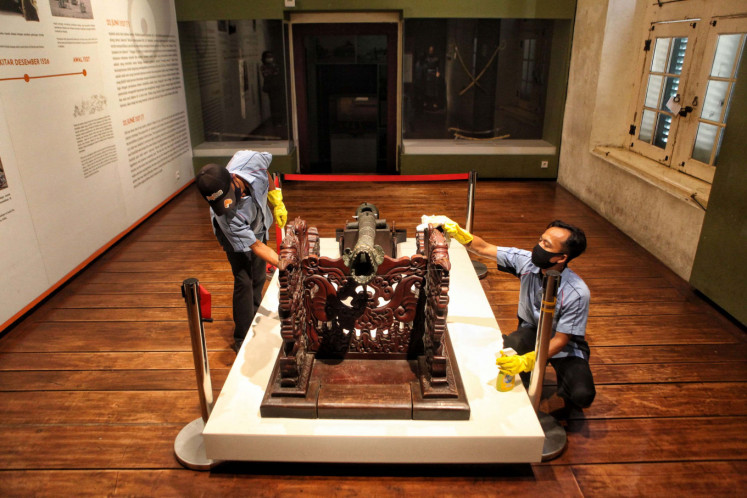Jokowi’s ‛Mr. Fix-It’, Luhut focuses on getting job done
His latest appointment by President Jokowi to helm a new committee that will be in charge of the Jakarta-Bandung railway project, taking over the role that had been occupied by Coordinating Economic Minister Airlangga Hartarto, is further proof of his reputation for getting things done.
Change text size
Gift Premium Articles
to Anyone

S
o instrumental and effective has been the role of Coordinating Maritime Affairs and Investment Luhut Binsar Pandjaitan in President Joko "Jokowi" Widodo's administration that he has earned many nicknames, including "Menteri Segala Urusan" (minister for all affairs), "Lord Luhut," "Luhut Lagi, Luhut Lagi" (Luhut again and again) and a moniker that best describes his role today: "Mr Fix-it".
His latest appointment by President Jokowi to helm a new committee that will be in charge of the Jakarta-Bandung railway project, taking over the role that had been occupied by Coordinating Economic Minister Airlangga Hartarto, is further proof of his reputation for getting things done.
The appointment was made shortly after Luhut achieved success in controlling the COVID-19 pandemic in the country, following the peak of a second wave in June, when the country recorded more than 50,000 cases per day. Cases have been trending downward since mid-September and daily cases today remain under 1,000 with a positivity rate remaining below 1.
Before taking charge of the effort to handle COVID-19, the 74-year-old former Indonesian Military (TNI) general had a long list of assignments, including the country's point man to deal with major superpowers such as the United States, China and Japan.
Luhut has also been playing a senior diplomatic role, as he is comfortable talking with Chinese senior officials like Foreign Minister Wang Yi, whom he referred to as "a good friend", while also managing to get access to senior members of the US government during the Trump administration, including Jared Kushner, if not Donald Trump himself.
Many have chalked up his ability to get things done to his leadership style, one that is result-oriented with a no-nonsense attitude.
“His commanding presence has enforced some discipline among the Cabinet members,” said Noory Okthariza, political analyst of the Centre for Strategic and International Studies (CSIS).
But it also helped that he had deep ties with President Jokowi, which were were first formed in 2008.
A Batak Christian born in North Sumatra, Luhut rose to become one of the most senior generals in predominantly Muslim Indonesia at a time when political Islam was rising after decades of repression.
Soon after the fall of Soeharto, Luhut left the TNI and was later appointed as the country's ambassador to Singapore from 1999 to 2000, before being named industry and trade minister in 2001 by then-president Abdurrahman "Gus Dur" Wahid.
After serving briefly in Gus Dur's short-lived administration, Luhut left politics to set up his own business, building a fortune running a commodities group that focused on natural resources (oil, gas and mining), power generation (coal, gas and geothermal) and agriculture.
In 2008, Luhut met Jokowi, then the mayor of Surakarta, and struck a business deal with Jokowi’s furniture company.
When Jokowi ran for president in 2014, Luhut joined the bandwagon and later played a key role providing political advice to the novice candidate, who was an outsider even to his own party the Indonesian Democratic Party of Struggle (PDI-P), helping him navigate the intricate political alliances and processes that characterize much of Indonesian politics.
Until today, Jokowi has been reliant on Luhut to implement some of his key policies, and against the advice of other members in his political coalitions the President continued to give key portfolios to him.
Luhut now has seven ministers reporting to him, including those holding investment, energy and tourism portfolios.
Luhut was also trusted to manage the massive project that will relocate Indonesia’s administrative capital from Jakarta to a new site in East Kalimantan.
As for his appointment to handle the Jakarta-Bandung high-speed railway project, Tauhid Ahmad of the Institute for Development of Economics and Finance (INDEF) said it was part of a plan to rescue what will become the symbol of improvement of Indonesia’s infrastructure, which can put pressure on ASEAN countries to bring in more investment.
Luhut's outsized role in Jokowi's administration has at times created controversy. For some critics, Luhut has been seen as representing the interests of the Chinese government, especially with its Belt and Road Initiative (BRI).
But for many of his supporters, Luhut is seen as someone who wields actual power and plays a key role in running the government.
"Whatever task given to him, he always gets the job done,” said Maj. Gen (ret) Istu Hari Subagio, who knew him when Luhut was still a colonel in Madiun.
With his growing clout and popularity, many of his supporters have even toyed with the idea of endorsing him for the country's highest office. Over the weekend, a group called Sahabat Luhut Binsar Pandjaitan (Friends of Luhut Binsar Pandjaitan) declared its support for him to run in the 2024 presidential election.
“We declare our support [for him to run] after seeing his work and achievements as Coordinating Maritime Affairs and Investment Minister during the seven-year journey in accompanying President Jokowi, both in normal times and during the pandemic,” Sarjan Andesbaya, Sahabat LBP spokesman said in a statement.
Political analyst Firman Noor of the Indonesian Institute for Sciences (LIPI) said that Luhut, given his reputation as a straight-talking Batak, understood his place in national politics well enough not to entertain the idea of running.
“Luhut is a seasoned politician. He doesn’t want to be consumed by such wishful thinking,” Firman said.
“He also knows that his chances are slim given that he comes from a minority [group].”
When asked if he had given thought about running in 2024, Luhut shrugged off the question. “We must know our place, everything under the sky has its time. Don't hurt ourselves. I never expected [to become president],” he told CNN Indonesia in a recent interview.









